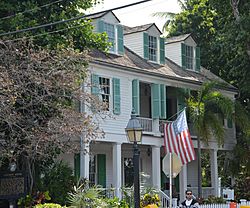Audubon House and Tropical Gardens facts for kids
 |
|
| Location | 205 Whitehead Street Key West, Florida |
|---|---|
| Type | History |
The Audubon House & Tropical Gardens is a special place located at 205 Whitehead Street in Key West, Florida. It's a museum that lets you step back in time.
The house is surrounded by beautiful gardens. These gardens cover about one acre and are filled with amazing tropical plants. You can see colorful orchids, bromeliads, and many other plants. There's also an herb garden and a nursery designed like those from the 1840s.
Inside the house, you'll find many old and interesting pieces of furniture. These antique items were bought from sales in Europe. They show what a wealthy home in Key West might have looked like long ago.
The museum also displays 28 original artworks by the famous bird expert, John James Audubon. Audubon visited the Florida Keys in 1832. During his trip, he saw and drew 18 new birds for his famous book, "Birds of America." Many people believe he created some of these drawings right in the Audubon House garden. His painting of the white-crowned pigeon even shows the special Geiger tree that grows in front of the house.
Next to the main house, there's the Audubon House Gallery. This gallery has a unique collection of Audubon's original art from the 1800s. It also features a wide selection of his bird images.
History of Audubon House
The Audubon House has a fascinating history. In 1958, the house was almost torn down. But a group called the Mitchell Wolfson Family Foundation stepped in to save it. This was the very first time an old building was restored in Key West.
The Audubon House Museum & Tropical Gardens officially opened in 1960. It was created by Colonel Mitchell Wolfson and his wife Frances, who were from Key West. They spent a lot of money to bring the house back to life.
They worked with a skilled architect named Alfred Milton Evans and his sons. The Evans family used special building methods to restore the house. These methods were passed down from their father, Sidney Evans, who was known for building large ships. Many old homes in Key West were built by the Evans family. You can often spot their work by the round wooden designs and large porches.
The Evans family used a unique shipbuilding technique to create curved doorways and stairways in the house. This made the house very special. The Audubon House is a great example of the American Classic Revival style from the mid-1800s.
The house was originally built by Captain John Huling Geiger. He was Key West's first harbor pilot, guiding ships safely into the port. Captain Geiger raised his children in this home and planted many beautiful tropical plants on the property.
It was these lovely plants that attracted John James Audubon when he visited in 1832. Audubon even took cuttings from the plants to use as backgrounds in his artwork. For example, the "Geiger tree" from the property is featured in his painting of the White-crowned Pigeon.
Saving the Audubon House was the first big restoration project in Key West. It is still seen as a shining example of how old buildings can be preserved. People who love antiques enjoy touring the house. They can see the unique furniture that would have been found in a wealthy Key West home in the 1800s.
Images for kids
 | Precious Adams |
 | Lauren Anderson |
 | Janet Collins |









